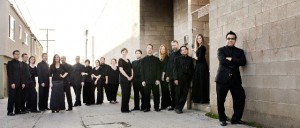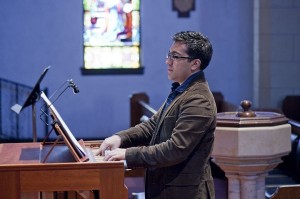The “Messiah” Nobody Knows
I can hear exasperated voices complaining, “Not another Messiah performance!” And still others asking, “Why do it in the spring, when Christmas is so far away?”
This weekend, BachCollegium San Diego under the direction of Ruben Valenzuela delivered a stunning account of G. F. Handel’s seemingly inescapable oratorio in three locations around the County. I was able to hear Sunday’s (March 17) performance at First Presbyterian Church in downtown San Diego.
But let me be clear—this was not just another thrown-together, hacked-up version of Messiah, some director’s concoction of movements his chorus could learn in time for the concert. Nor was it Messiah-lite, boiled down to an hour and ten minutes so the party-attending audience could do something more enjoyable with their evening after a quick sampling at the Handel buffet.
This was the complete oratorio, all 54 sections, clocking in at precisely three hours. Choosing the composer’s earliest performed version and orchestration, Valenzuela assembled his usual cadre of astute period instrumentalists and a chorus of 17 vocal soloists, ten of whom sang solo portions of the work.
At long last—the real Messiah—and given in an incarnation the composer might have actually recognized. The issue, of course, is not authenticity for its own sake, but rather an approach that allows the music to communicate as vividly as the composer intended. The success of the BachCollegium San Diego was unleashing the expressive power of Charles Jennens’ perceptively assembled libretto and Handel’s ravishing music in a way that made a work so familiar sound uncannily original and fresh.
Let me start with the more astonishing singers. Baritone Paul Max Tipton was riveting: combining crystalline declamation with a honeyed timbre, he constantly renewed his take on repeated figurations, daring the listener to miss a single phrase. Jessica Petrus’ brilliant, agile soprano brought apt elation to her lively arias, and her understated cadenzas were both exciting and tasteful.
Tenor Scott Mello sustained his velvet legato with such calm assurance, I began to think he didn’t need to breathe, but when called upon to sing a furious recitative, he proved marvellously frightening. No one could touch the dramatic exuberance of countertenor Charles Humphries, although his aria “He Was Despised,” does tempt operatic indulgence. His slightly reedy timbre provided a felicitous balance to John Russell’s bright tenor in their ardent duet “O Death, Where Is Thy Sting.”
The other fine soloists were sopranos Anne-Marie Dicce and Rebecca Kellerman Pettretta; mezzo Angela Young Smucker, tenor Matthew Tresler, and baritone Jeff Fields. Hearing this many contrasting solo voices over the three hours was not only musically pleasing, but good psychology.
Valenzuela kept the chorus tempos on the bright side, but never at the expense of textual clarity. Because each section sang with such unanimity and unceasing emotional commitment, this chorus of 17 singers proved more viscerally exciting than any chorus of 100-plus voices crammed behind a symphony orchestra.
From Concertmaster Pierre Joubert to bassist Shanon Zusman, the strings sparkled: precise, clean phrasing with very little vibrato and unswerving, disciplined ensemble. Michael Sponseller’s masterful continuo realizations on both harpsichord and chamber organ amaze me anew every time I encounter his playing.
PS: For those who mistakenly think that Messiah is a Christmas cantata:[php snippet=1] it never was one. Handel wrote it to be given in the spring, during Lent, when it was easy to rent a theatrical space. The oratorio is not about the Nativity, but rather a philosophical discourse on the ideas of Messiah that the librettist Jennens found in the Hebrew and Christian Scriptures. They called it an “entertainment,” although in the 18th century, tractor pulls and reality TV had not sullied that noun.
[box] The next program of BachCollegium San Diego is “Venetian Vespers” on May 17 & 18, 2013, featuring music by Monteverdi, Grandi, Cavalli, and Rigatti. See the webstie www.bachcollegiumsd.org for details.[/box]

Ken Herman, a classically trained pianist and organist, has covered music for the San Diego Union, the Los Angeles Times’ San Diego Edition, and for sandiego.com. He has won numerous awards, including first place for Live Performance and Opera Reviews in the 2017, the 2018, and the 2019 Excellence in Journalism Awards competition held by the San Diego Press Club. A Chicago native, he came to San Diego to pursue a graduate degree and stayed.Read more…


